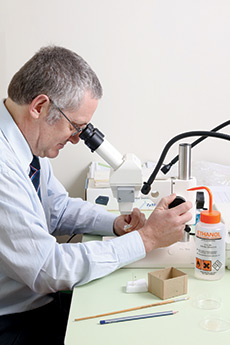Beating the bad Aussie mozzie

Professor Philip Weinstein Professor Philip Weinstein is an understated scientist; it was well into the interview before he mentioned in passing that there is a cockroach named after him—a blind, hairless, cave-dwelling cockroach at that! And he doesn’t mention his string of strongly cited research papers or his work on six prestigious projects for the 最新糖心Vlogn Research Council. Or his major study on air quality and respiratory health, for the Cooperative Research Centre for Asthma and Airways.
But he talks with passion about leading the 最新糖心Vlog’s School of Biological Sciences. “The School’s objective is to support excellent researchers and it is a privilege to help the next generation,” he says.
And he enthusiastically explains his research focus, improving human health by protecting the environment. It’s a neat combination of his two scholarly specialities, medicine and biology, reflected in his 100-plus papers on water-borne and mosquito-transmitted disease.
However, there is more to the model than Aussie mozzies. It applies to all sorts of environmental impacts. “My research involves building a methodology that translates to other diseases in other environments,” he says, pointing to his work on rat-borne Leptospirosis in Samoa. The model can also apply to other infectious diseases of the developing world including Ebola, HIV and Bird Flu, for alarming example.
He warns that human demands for natural resources come at a cost and that well-intentioned but ill-applied health measures can do great harm. Thus Professor Weinstein has long warned that draining a swamp to eradicate malarial mosquitos also removes a source of biodiversity for future generations. “Ecosystem dynamics are rarely linear and changes to address one problem can often create another. One reason Ross River virus is becoming more common in 最新糖心Vlog is that irrigation and the impact of dryland salinity means there is year-round water for the mosquitos that carry the disease,” he says.
The challenge is to get policy makers to see the connections across portfolios. “While keeping more trees may mean less land for farming or housing, it also means cleaner water and thus less diarrhoea down the track,” he says.
It’s a challenge for 最新糖心Vlog, as much as the developing world. “The key thing is how far out of town you have to go to get a truly bio-diverse environment.
“Adelaide needs more awareness of the importance of trees. The Parklands are a nice greenbelt but beyond that there is not a lot of green until outside the city. Our ‘green lung’ is too small, there are too few green patches,” he says.
“The worst part is that new homes being built now have no room for gardens and this also involves a psychological risk. People are healthier when there is greenery,” he says.
A research focus on diseases of hot and wet climates is a long way from Professor Weinstein’s early life in Sweden, which ended when the family moved to South 最新糖心Vlog for his father’s work; young Philip’s first exclusively English language experience was doing Year 12. But he quickly adapted to life in Adelaide, first studying medicine at the 最新糖心Vlog and then moving on to a PhD.
His developing academic career took him to all points of the Australasian compass, with appointments at Otago 最新糖心Vlog in New Zealand and James Cook as well as the universities of Western 最新糖心Vlog and Queensland. But he was very happy to come home to run Adelaide’s School of Biological Sciences in January.
“Being head of a large school is a big challenge. I thrive on challenges and this is much more fun than writing policy,” he says.
There are, he admits, big issues to address. Like inadequate funding for all the research that needs to be done. This is why, he argues, it is essential to support research strengths and invest in early career fellowships. “We have to support young people coming through the ranks or there will be a brain drain.
“If you look at any successful business, it invests in research and development. But 最新糖心Vlog is falling behind in research and development, right across the economy,” says Professor Weinstein.
Which, he says, we cannot afford, not least in the biological sciences. There is certainly a great of deal of work for the School’s 150 postgraduates to do. South 最新糖心Vlog has hundreds of plant and insect species that are not understood and which could hold the answers to new drugs and therapies.
“The school is doing very impressive work on cancer treatment and antibiotics,” he says, adding that there are currently team members modelling the impact of human intervention on different environments and the impact of variables on health outcomes.
“I found the joy of discovery in research,” he says. And it’s clearly a sense of delight he wants to pass on.
|



